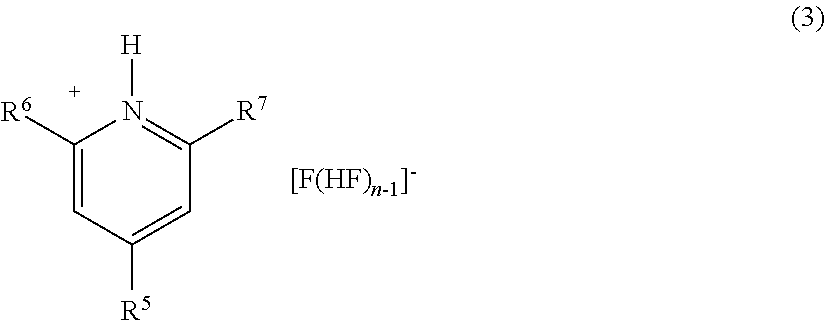Method for manufacturing methyl fluoride
a technology of methane fluoride and manufacturing facilities, which is applied in the field of methane fluoride production methods, can solve the problems of increasing the cost of manufacturing facilities, easy deterioration of catalysts, and easy corrosion of manufacturing facilities, and achieves high selectivity, high starting material conversion, and high selectivity.
- Summary
- Abstract
- Description
- Claims
- Application Information
AI Technical Summary
Benefits of technology
Problems solved by technology
Method used
Image
Examples
examples
[0055]The present invention is described below in more detail with reference to Examples.
examples 1 to 5
1. Examples 1 to 5
1.1 Example 1
[0056]After 12 g (0.21 mol) of potassium fluoride and 25 g of pure water were placed in a 100-cc pressure-resistant container, 10 g (0.08 mol) of dimethyl sulfate was added to start the reaction. After the temperature had reached 100° C., the reaction was allowed to proceed for 5 hours. The final pressure was 0.15 MPa / G. The generated gas was collected and analyzed by gas chromatography. With the theoretical yield of methane fluoride obtained by this reaction being assumed to be 0.08 mol, the yield of methane fluoride was calculated and found to be 0.08 mol. The yield was 100%.
example 2
1.2 Example 2
[0057]After 10 g (0.17 mol) of potassium fluoride and 20 mL of acetonitril were placed in a 100-cc pressure-resistant container, 10 g (0.08 mol) of dimethyl sulfate was added to start the reaction. The reaction was allowed to proceed at 100° C. for 4 hours. The gas generated was collected and analyzed by gas chromatography. With the theoretical yield of methane fluoride obtained by this reaction being assumed to be 0.08 mol, the yield of methane fluoride was calculated and found to be 27%. The selectivity of methane fluoride in the generated gas was 71%. As impurities, 21% of dimethyl ether and 8% of methyl formate were detected.
PUM
| Property | Measurement | Unit |
|---|---|---|
| molar ratio | aaaaa | aaaaa |
| boiling point | aaaaa | aaaaa |
| boiling point | aaaaa | aaaaa |
Abstract
Description
Claims
Application Information
 Login to View More
Login to View More - R&D
- Intellectual Property
- Life Sciences
- Materials
- Tech Scout
- Unparalleled Data Quality
- Higher Quality Content
- 60% Fewer Hallucinations
Browse by: Latest US Patents, China's latest patents, Technical Efficacy Thesaurus, Application Domain, Technology Topic, Popular Technical Reports.
© 2025 PatSnap. All rights reserved.Legal|Privacy policy|Modern Slavery Act Transparency Statement|Sitemap|About US| Contact US: help@patsnap.com



